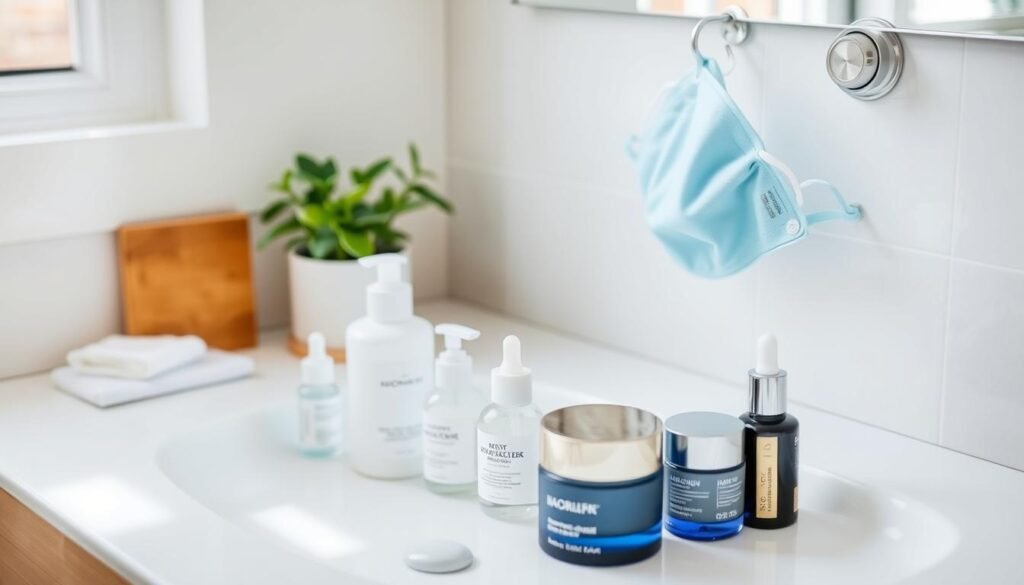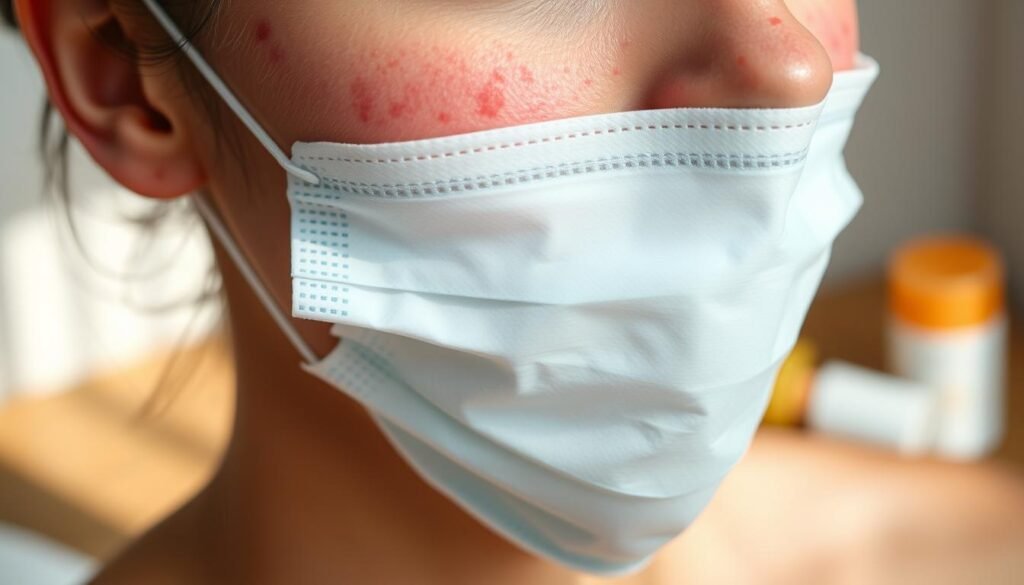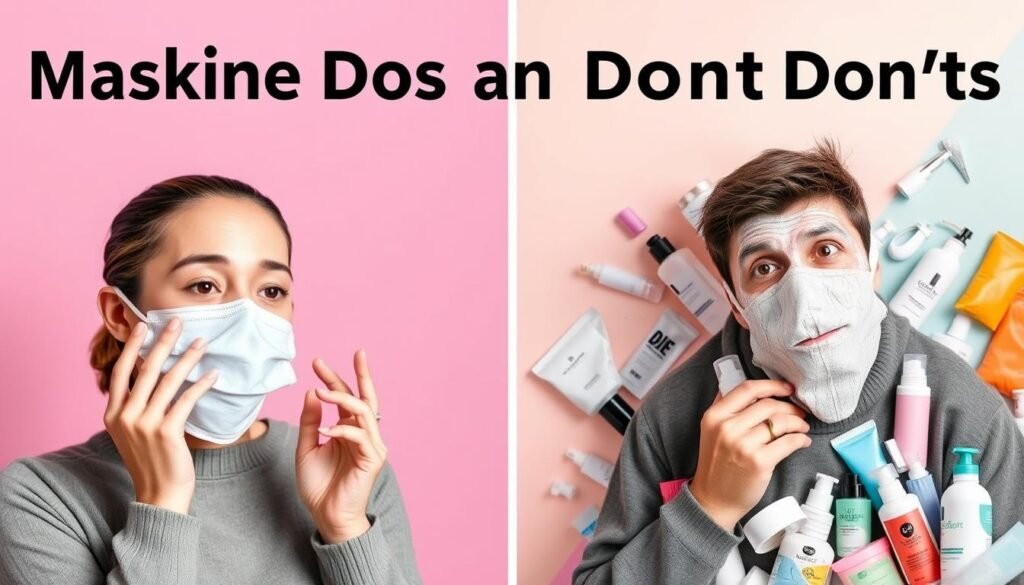More than half of Americans are now fully vaccinated. This has led many cities to advise or mandate indoor mask-wearing, no matter if you’re vaccinated. This situation has caused a rise in mask-induced acne, also known as maskne. People are finding it tough to keep their skin clear while following health rules. This article will share key tips on treating and preventing maskne. You’ll learn how to keep your skin clear even with a mask on. It covers understanding maskne causes and setting up a good skincare routine. This guide is here to help you fight the impact of masks on your skin’s health.
Key Takeaways
- Regular changing of disposable masks helps prevent unwanted breakouts caused by oil buildup.
- Choosing oil-free or noncomedogenic skincare products can aid in maintaining clear skin.
- Daily cleansing with gentle facial cleansers can reduce sweat and oil accumulation.
- Friction reduction techniques, such as using pads under mask straps, minimize discomfort and irritation.
- Consulting a board-certified dermatologist may be necessary for persistent maskne issues.
Understanding Maskne and Its Causes
Maskne is acne that appears from wearing face masks. It is now common to see acne near the mask area, especially on the cheeks, chin, and nose. The rise in these breakouts is linked to wearing masks for long periods.
The main maskne causes are the heat and humidity under the mask, which help bacteria grow. Also, the mask rubbing against your face can block pores and worsen acne. Dr. Shari Lipner, a dermatologist, finds more people are getting acne in the face’s center because of masks.
To stop and handle maskne, it’s important to care for your skin properly. Washing your face with a soft, no-scent cleanser can cut down on breakouts. If you get acne from masks, try to skip makeup, or use products that won’t clog pores.
Choosing masks made of light materials like cotton or silk helps keep skin healthy. If you use disposable masks, change to a new one every day. While masks can be tough on the skin, these tips can lessen their effect.
For more on maskne and how to treat it, looking into expert advice and suggested products can help those struggling with this problem.
How to Treat and Prevent Maskne
To manage maskne effectively, you need a daily skincare routine. This should involve gentle cleansing and moisturizing for acne-prone skin. The right product mix can lessen breakouts and improve your complexion.
Adopting a Daily Skincare Routine
A solid daily skincare routine is key to fighting maskne. Start by washing your face with a gentle cleanser, maybe one with salicylic acid. Using it a few times a week can clear oil and dirt. Then, moisturize with a non-comedogenic product to stay hydrated without blocking pores. If breakouts are common, consider using benzoyl peroxide (2.5 or 5 percent) for spot treatment.
Choosing the Right Products for Acne-Prone Skin
Selecting the right acne care items is crucial. Opt for oil-free, non-comedogenic products. Avoid thick moisturizers or heavy makeup under masks to prevent acne. A tinted moisturizer with SPF can cover while protecting from the sun. Make sure to apply it each morning before putting on a mask. Washing your mask daily with a fragrance-free detergent will help keep your skin healthy.
Effective Acne Skincare Tips
Proper skincare is crucial for managing mask-related acne, or “maskne.” It’s important to choose products that meet individual skin needs. Following key acne skincare tips can significantly improve skin health and decrease breakouts.
Using Gentle Cleansers
Opting for gentle cleansers for skin care helps minimize irritation, important for regular mask users. Foaming cleansers with salicylic acid are great, targeting acne without removing essential oils. Adding a gentle cleanser to your daily routine, in the morning and before bedtime, lays the groundwork for healthier skin.
Importance of Non-Comedogenic Moisturizers
Using non-comedogenic moisturizers is crucial for those prone to acne. These moisturizers don’t clog pores, thereby preventing further acne issues. For oily and acne-prone skin, oil-free moisturizers are advised. Normal or combination skin types may find lightweight lotions useful. Dry skin, on the other hand, benefits from cream moisturizers offering necessary hydration without causing breakouts.
| Skin Type | Recommended Cleanser | Recommended Moisturizer |
|---|---|---|
| Oily/Acne-Prone | Salicylic Acid Foaming Cleanser | Oil-Free Moisturizer |
| Normal/Combination | Hydrating Gel Cleanser | Lightweight Lotion |
| Dry | Creamy Cleanser | Cream Moisturizer |
Incorporating these steps into your skincare routine helps achieve clearer skin and reduces irritation from masks. Remember, sticking to your skincare steps consistently is essential for best outcomes.
Face Mask Breakouts: What to Look For
It’s important to recognize acne caused by wearing masks, known as face mask breakouts. Specialists are seeing more cases of maskne, especially around the mouth, jaw, and chin. Look out for red spots, irritation, and both whiteheads or deep pimples.
More than half of skin doctors have seen more acne from wearing masks lately. Some people’s existing acne gets worse, while others who’ve never had acne are now breaking out. This is due to their mask.
Noticing identifying acne early helps you act fast to fix it. Watching your skin’s reaction to masks, you can find the right solutions. You might need to change your mask type if you have acne-prone skin.
- Redness and irritation around the mask areas
- Development of whiteheads and cystic acne
- Flakiness and peeling of the skin
- Aggravation of existing skin conditions like eczema
Using gentle face washes and moisturizers that don’t clog pores is key. This can help manage face mask breakouts well.
Maskne Remedies That Work
Many people are looking for ways to treat maskne effectively. Using Over-the-Counter Acne Products regularly can clear up the skin. If your acne is mild, you might like natural Home Remedies for Acne. Knowing the difference between these options can help you pick the best one for you.
Over-the-Counter Treatments
Benzoyl peroxide and salicylic acid are common in many acne products. They target bacteria and unclog pores. Here are some good picks:
- Differin Gel with Adapalene 0.1% works well for treating breakouts.
- NeoStrata Foaming Glycolic Wash has 18% glycolic acid for peeling.
- La Roche-Posay Toleriane Purifying Foaming Face Wash is best for oily types.
Home Remedies for Mild Cases
For mild maskne, Home Remedies for Acne might be enough. Some effective ones are:
- Tea Tree Oil fights inflammation, reducing redness and swelling.
- Aloe Vera moisturizes and calms irritated skin, aiding recovery.
- Petrolatum-based items protect skin in high-rub areas.
Using both over-the-counter options and home remedies can battle maskne more effectively. This improves your skin health and makes you feel better.
| Type | Product | Main Ingredient | Benefits |
|---|---|---|---|
| Over-the-Counter Treatment | Differin Gel | Adapalene 0.1% | Spot treatment for acne |
| Over-the-Counter Treatment | NeoStrata Foaming Glycolic Wash | 18% Glycolic Acid | Exfoliation for clearer skin |
| Home Remedy | Tea Tree Oil | Natural Extract | Reduces inflammation and bacteria |
| Home Remedy | Aloe Vera | Natural Gel | Soothes and hydrates skin |
Maskne Prevention Strategies
To prevent maskne, keep face masks clean and choose the right fabrics. Using effective strategies like regular washing and picking the best materials can greatly lower skin irritation and breakouts.
Washing Your Face Mask Regularly
It is crucial to wash face masks daily. This removes oil, dirt, and bacteria. The CDC advises washing cloth masks after each use.
This step keeps your skin clear and prevents maskne. It also keeps the mask fresh and comfy on your skin.
Choosing Appropriate Mask Materials
Fabric choice is key for avoiding maskne. Choose breathable materials like cotton or silk. These allow air flow and reduce friction.
Avoid synthetic fabrics to lessen irritation from heat and sweat. Comfortable fabrics make long-term wear easier and protect your skin.

Mask-Induced Acne: Common Symptoms
It’s crucial to know the skin problems caused by wearing masks. People often face Mask-Induced Acne Symptoms like swelling, breakouts, and rashes. The area under the mask gets warm and moist. This is ideal for bacteria and yeast to grow.
Spotting Recognizing Skin Issues early is vital. More people are getting mask acne since wearing masks is now common. This issue affects everyone, especially young adults. They see red bumps and their skin gets oilier around the mouth and nose.
Here are common signs of Maskne:
- Redness and irritation in the mask area
- Small, hard-to-get-rid-of pimples on the jawline and cheeks
- Worse outbreaks of skin problems you already had, like rosacea or dermatitis
Knowing the Common Symptoms of Maskne helps people care for their skin better. It’s important to deal with these problems fast. This avoids physical and emotional pain. It helps keep the skin clear while we still need to wear masks.
Maskne and Skin Irritation
Maskne is a big worry for people who wear masks a lot. Things like humidity and rubbing against the skin can cause problems. Knowing about these can help us choose the right skincare and masks.
Understanding the Impact of Humidity and Friction
The Humidity Effects on Skin play a big role in skin issues under masks. A warm, moist area under a mask can hold sweat and oil, leading to more irritation. When masks rub on our skin for too long, it can cause acne or even rosacea.
Wearing a mask can lead to issues like itchiness and red patches. To avoid this, pick a mask that’s comfy and made of soft, natural materials like cotton. This helps lessen the rubbing.

Looking after your skin is key to avoiding Maskne and Skin Irritation. Clean your face with a gentle cleanser after wearing a mask. Then, use a moisturizer or a barrier cream to keep your skin from getting too dry.
If your skin still bothers you, it might be time to see a dermatologist. They can give treatments to reduce redness and keep your skin feeling good in a mask. Taking care of this early helps keep your skin clear.
The Role of Diet in Skin Health
A balanced diet is key for good skin health. The link between Diet and Skin Health shows that some foods may harm or help skin conditions. Antioxidant-rich foods, vitamins, and omega-3 fatty acids help achieve clear skin.
Eating habits can affect acne. Foods with high glycemic index (GI), like sweets and processed snacks, can worsen acne. Adding complex carbohydrates and proteins to your diet, however, might help. This is especially true for hormonal acne on the chin and jawline.
Nutrition for Clear Skin suggests that a diet low in sugars and processed foods helps skin look better. Including anti-inflammatory foods like fatty fish, nuts, and various fruits and veggies helps balance blood sugar and reduce inflammation.
A good diet might not fix everything, like cystic acne, but it helps when combined with treatments. For bacne, changing what you eat could bring small benefits. Staying hydrated is also crucial for skin health.
In summary, eating the right foods is vital for skin health. While changes in diet have different effects on acne, combining good nutrition with skincare leads to clearer, healthier skin.
Maskne Dos and Don’ts
Handling maskne means balancing skincare and makeup correctly. Following these tips can make your skin healthier and lessen breakouts. It also ensures wearing masks is more comfortable. By using good Skincare Tips, you can keep your skin clear, even with a mask on.
Do Clean Your Face and Mask
Cleaning your face and mask often is key to preventing bacteria and oil buildup. You should clean your face with a gentle, fragrance-free cleanser for acne-prone skin twice a day. Switch disposable masks daily, and wash reusable ones after each wear. This habit keeps breakouts at bay and boosts skin health. Choose masks made from double-layered cotton. This material is breathable and good at blocking airborne particles, helping to stop maskne.
Don’t Overapply Makeup
Too much makeup under a mask can block pores and make maskne worse. It’s best to use light, non-comedogenic makeup that lets your skin breathe. Makeup Guidelines suggest using just enough and keeping it simple. After removing your mask, clean your face well with a water-based cleanser. This removes dirt and freshens up your skin. Pairing minimal makeup with good skincare will help you maintain clear skin.

Consulting a Dermatologist When Necessary
Maskne has become a big issue for many because of wearing masks for a long time. The wet and bacteria-filled area inside masks creates a perfect place for acne to grow. When home remedies don’t work, consulting a dermatologist is key.
Knowing when to see a dermatologist is crucial if maskne doesn’t go away. Even after using mild cleansers with salicylic acid and the right skincare, you might need extra help. Dermatologists can identify different skin problems and give treatments that match your needs.
Sometimes, professional acne treatment involves special products that work better than what you find in stores. A tailored plan helps you face your unique skin challenges better. Going to an expert can make your skin healthier and less prone to acne.
Going to certified dermatologists can make your skincare routine much better, reducing the downsides of masks. Regular check-ups help control skin issues, keeping your skin clear and healthy. This is important even as we follow ongoing health rules.
Dealing with usual acne or issues like folliculitis and dermatitis calls for quick action. Expert advice from dermatologists is key to getting clearer skin.
Making Lifestyle Adjustments for Clear Skin
Want clear skin? Start with these lifestyle changes. Drinking water is key; it keeps your skin moist and elastic. Add stress management like meditation or yoga to avoid stress breakouts. This way, you boost your skin’s health.
Don’t underestimate good sleep. It’s when your skin cells repair themselves. A regular sleep schedule helps keep your skin clear.
Choosing the right skincare products matters too. Use a 2 oz. Salicylic Acid Cleanser to unclog pores. A moisturizer with SPF, like Dual Defender SPF 30, hydrates and protects against the sun. A daily routine, morning and night, with the SLMD Acne System keeps skin treated and nourished.
These tips also help fight problems from wearing masks, like maskne. Humidity and friction from masks can cause breakouts. With consistent care and smart lifestyle changes, you can tackle these issues head-on.
| Lifestyle Change | Benefit | Recommended Product |
|---|---|---|
| Stay Hydrated | Improves skin elasticity and moisture | N/A |
| Manage Stress | Reduces breakouts caused by stress | N/A |
| Get Adequate Sleep | Promotes skin regeneration | N/A |
| Use Salicylic Acid | Unclogs pores and prevents breakouts | 2 oz. Salicylic Acid Cleanser |
| Moisturize | Locks in hydration and protects skin | Dual Defender SPF 30 |
| Follow a Skincare Regimen | Ensures consistent care | SLMD Acne System |
Conclusion
To tackle maskne, it’s crucial to know why it happens and use the right skin care strategies. Many people, especially those who often get acne, struggle with maskne due to wearing masks. By using the tips we’ve shared, you can keep your skin clear while staying safe.
For healthy skin, create a skin care plan that includes soft cleansers and moisturizers that won’t clog pores. Making changes in your lifestyle and choosing the right can also reduce acne. Choose masks made of cotton for better skin health.
Maskne can be annoying, but it’s not forever and you can control it with good skin care habits. By following these tips, you’ll have the knowledge for better skin health. This boosts confidence, even when you need to wear a mask.